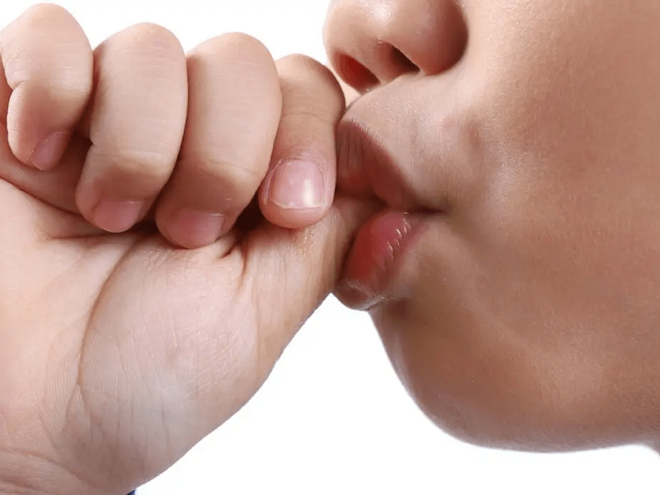
How Do I Let My Child Stop Thumb Sucking?
While it’s true that the incidence of thumb sucking in developing countries has declined in recent years, it remains a common behavior among infants and young children. Recent studies found thumb/finger-sucking behavior during infancy are at 10% to 34%, with a male to female ratio of 1:1.
Thumb sucking happens more often during sleep in the first few months of life. However, by the end of the first year, more infants suck their fingers while awake during the day. There are several theories about why infants and young children engage in these behaviors. In the psychoanalytic theory (Freud), it is believed that sucking is a newborn reflex and that thumb sucking is a form of “infantile sexuality”; when it persists past the oral phase of infancy, thumb sucking can be the result of an “emotional disturbance.” Another theory describes finger sucking as an innate behavior that becomes a habit, a learned behavior. Others believe that because thumb sucking is soothing to the infant, the habit persists in some children when they are bored, tired, or anxious.
Most of the time, thumb/finger sucking is a harmless habit that has no consequences or concern. However, children who suck their thumbs chronically have a higher incidence of paronychia, herpetic whitlow, irritant eczema, and accidental ingestion, and can develop calluses and, rarely, digital deformities that require surgery. There are also dental consequences, including malocclusions, such as posterior cross bite, anterior open bite, and excessive overjet. Moreover, older children who suck their thumbs are subject to social stigma; they may be ridiculed by peers as well as their parents, and they may be treated as immature and less socially acceptable.
It is important to remember that thumb/finger sucking is usually not problematic and that most children stop thumb sucking by 4 years of age, hence, treatment should not be pursued before 4 years old. Furthermore, in older children, if the behavior is infrequent or does not interfere with dentition, cause social stigma, or harm self-esteem, therapy is not necessary. For other children, therapy is recommended when thumb sucking becomes a psychological issue or is having detrimental effects on dentition.
Here are some tips for parents to help their child stop the habit of thumb sucking:
- Praise and reward your child when she does not suck her thumb. Star charts, daily rewards, and gentle reminders, especially during the day, are also very helpful.
- If your child uses sucking to relieve boredom, keep her hands busy or distract her with things she finds fun.
- If you see changes in the roof of your child's mouth (palate) or in the way the teeth are lining up, talk with your pediatrician or pediatric dentist. There are devices that can be put in the mouth that make it uncomfortable to suck on a finger or thumb.
Primary care physicians should always remember that ongoing monitoring is essential to ensure that the therapy is working, that the technique is appropriate for the child and family, and that the intervention is not causing more stress or psychological strain than the problem itself.
Reference
About The Writer
DR. JOSELYN EUSEBIO, Developmental-Behavioral Pediatrician
Dr. Joselyn C. Alonzo-Eusebio is a graduate of Doctor of Medicine from the University of the East Ramon Magsaysay Memorial Medical Center. She had her Pediatric Residency Training in the same institution, after which, she pursued a fellowship in Developmental and Behavioral Pediatrics at UP-PGH. She had had further trainings in Developmental Pediatrics abroad (US and UK).
Dr. Eusebio is involved both in teaching and in clinical practice. For the academe, she’s currently an Associate Professor of the College of Medicine of UERMMMC, and Clinical Instructor at the New Era College of Medicine and St Luke’s College of Medicine. Dr. Eusebio holds various positions including the following: Chairman, Department of Pediatrics, UERMMMC; Head, Section of Developmental and Behavioral Pediatrics at National Children’s Hospital; Vice-President, Philippine Pediatric Society and the Perinatal Association of the Philippines.
She’s a much sought-after speaker in conferences, scientific symposia, lay fora, here and abroad, both in platforms and in media, most especially on the topic of child development and behavior.
The views and opinions expressed by the writer are his/her own, and does not state or reflect those of Wyeth Nutrition and its principals.
Thumb and Finger Sucking. Lynn Davidson. Pediatrics in Review 2008; 29;207 DOI:10.1542/pir.29-6-207
Thumbs, Fingers, and Pacifiers (Copyright©2006 American Academy of Pediatrics, Updated 3/2012)









